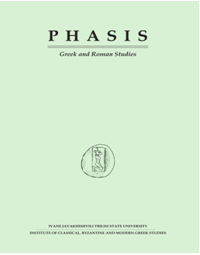Prometheus bei Grigol Robakidse
DOI:
https://doi.org/10.60131/phasis.17.2014.2324Abstract
Grigol Robakidze’s predilection for myth is well-known. For him, a myth was not just a matter of the past but a living presence and relevant in the politics of his time. He was fascinated by Prometheus, known in Georgia as Amirani and almost identical with his Greek counterpart – Amirani has, however, no deliverer like Heracles, his torture on a rock of the Caucasus does not end (if it did, the Golden Age would begin). In his novel Die Hüter des Grals (1937) the first chapter, entitled Promethean Ecstasy, implies that Prometheus’s punishment is justified because he was too self-empowered if not self-righteous, and in their ecstatic struggle for absolute freedom this is a weakness that endangers Caucasian men. Thus the guardians of a second grail, a miraculous gift from Saint Nino, are also doomed to failure in their struggle against the Soviets’ attempts to profane what they adore. The Soviet power cannot, however, ultimately destroy the grail and the Georgian heart that it represents. This same idea is developed in a loosely structured essay Das Geschlecht des Prometheus, which my colleague and I recently discovered. Robakidze wrote it for the Brüsseler Zeitung (no. 236, 26 August 1942), and in it he describes distinguished Georgian freedom fighters whose uncompromising attitude of self-ratification places them in the Promethean ‚danger zone‛. The traditional role of a thavad is the paradigm of a Promethean hero in Robakidze’s view. He discusses outstanding leaders in Georgian history and notes the ambivalence between their utter devotion to the worthy cause of obtaining freedom and their egotistic transgression of a taboo. Even though such heroes may fail, Georgians admire them intensely for their courage and dedication. Of consequence, in this case, is that the essay, supposedly only on a Georgian myth, and far removed from the immediate concerns of its readers, was published in occupied Brussels, in a Nazi-controlled German newspaper.Downloads
Published
2014-05-17
Issue
Section
Articles
License
Copyright (c) 2014 PHASIS

This work is licensed under a Creative Commons Attribution-NonCommercial 4.0 International License.


